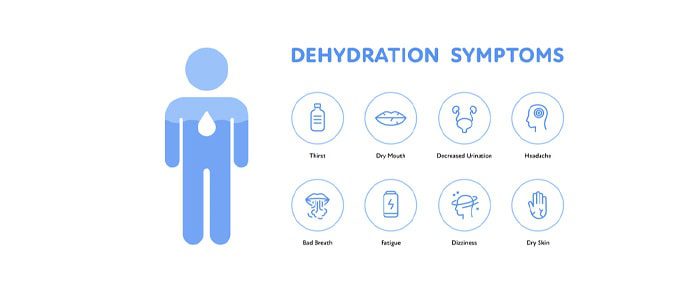Heat stroke and heat exhaustion are serious health illnesses, and while emphasizing the importance of hydration, many forget about the link between dehydration and mental health.
Being dehydrated is not necessarily linked to not drinking enough water or overexertion. Those with mental or medical health conditions could easily become dehydrated without realizing it. As a result, you need to help your clients understand a bit more about dehydration by learning a few fundamental principles of how staying hydrated relates to overall health.
Dehydration and the body

Before we dive into the connection between dehydration and mental health, let’s look at how dehydration affects the rest of the body.
Dehydration can lead to problems with logical thought, motor function, and more. Some clients, including those with mental illnesses, may report increased appetites.
There are several signs of dehydration, many of which can be mistaken for symptoms of more serious issues. For example, dark, concentrated urine can be caused by a variety of issues, ranging from impaired renal function to medication side effects. As a result, your clients may conclude something is terribly wrong.
If you’re worried that your client has become dehydrated or is at risk of becoming dehydrated, keep an eye out for the below symptoms. If you notice your client exhibiting symptoms of dehydration, help them to hydrate and work to assuage any anxiety they have over the symptoms.
Some of the symptoms of dehydration include:
- Fewer or reduced urges to urinate.
- Darkly-colored urine.
- Fainting.
- Changes in ability to process information, including trouble concentrating.
- Fatigue.
- Dry skin and mouth
- Changes in appetite.
Dehydration and mental health

As research in integrative healthcare has advanced, the links between dehydration and mental health have become apparent. Studies have found that dehydration leads to difficulties in short-term memory, changes in mood, and impairments to cognitive function.
To better understand the connection between good hydration and mental health, let’s look at three different psychological states that can be brought on or worsened by dehydration.
Dehydration and hallucinations
Dehydration can result in a dramatic loss of electrolytes from the body through urination. As the body attempts to compensate for lower osmotic pressure, a measure of the pressure between external and internal fluids across cellular membranes, it begins to excrete sodium and electrolytes from the body. This can result in a state of hyponatremia, which can cause hallucinations or coma, which some may interpret as catatonia.
When dehydration reaches the point of causing hallucinations, emergency medical intervention is required. Failure to restore the osmotic balance in the body can lead to organ failure and permanent brain damage. Moreover, the changes in mental capacity leading up to this point can further exacerbate dehydration.
For example, a client experiencing anxiousness or hallucinations may be exhibiting a mental health crisis. As a result, the client may be admitted for inpatient hospitalization, but that does not mean they will have lab work completed immediately. Consequently, all persons involved in the care of those with mental health issues need to ensure their clients are getting fluids regularly from both drinking and eating.
Can dehydration cause anxiety?
Yes and no. Dehydration can cause feelings of anxiety to increase. But, it does not lead to or cause anxiety disorders.
Let’s explore this correlation between dehydration and feelings of anxiety. When your body becomes dehydrated, it goes into survival mode. Your muscles tense up, hormones can’t reach the proper places in your body, and more. As your body undergoes this stress, your anxiety levels naturally go up.
One study found that people who drink upwards of five cups of water a day were at lower risk of anxiety. This increase in anxiety could very well be related to the affects dehydration has on cognitive functioning and ability. However, experts note that more research is required to fully understand the link between dehydration and anxiety.
Dehydration and depression
Research has found a link between dehydration and depression. A 2018 study, in fact, found that 73% of men who drink less than two cups of water per day had a greater risk of depression. The study also found that 54% women who had the same daily water intake experienced increased risk of depression.
For those experiencing more mild cases of dehydration, this lack of water can exacerbate preexisting depression. In industrialized nations where clean drinking water is easily accessible, this is more common.
To explain the link between dehydration and depression, experts point to water’s role in creating amino acids and serotonin, both of which help to regulate energy levels and mood.
Final thoughts
Dehydration can prove much more than an inconvenience. It can be deadly, and it can lead to the misdiagnosis of mental health problems. As a social worker, clinician, caregiver, or advocate for better health among the community you serve, you need to thoroughly understand how dehydration can impact the body and mental health. Above all else, teach your clients to E.A.T. to stay hydrated:
- E – Eat foods with a high water content.
- A – Avoid eating when hunger strikes at first. Drink a cup of water instead.
- T – Think clearly; if you can’t, you could be dehydrated.
Learn How Relias Can Help
Find out how Relias’ proven solutions can help your organization with staff development, business improvement, compliance, and more. Request a personalized demonstration today.
Learn More →





